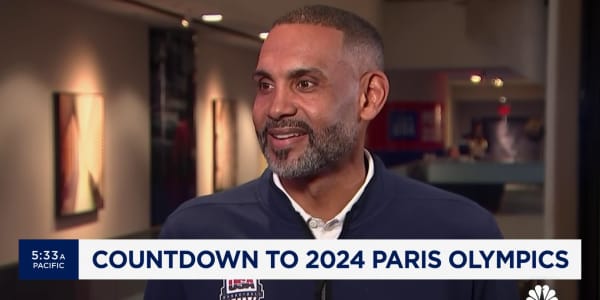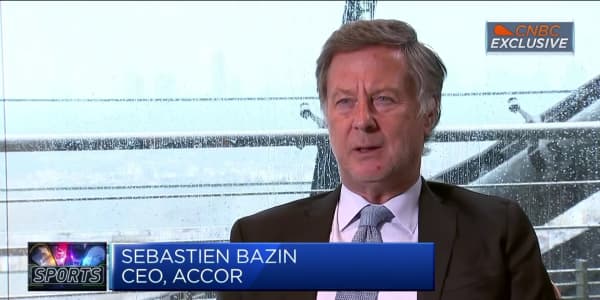In an extraordinary show of unexpected unity, North and South Korea sat side by side Friday night under exploding fireworks that represented peace, not destruction, as the 2018 Winter Olympics opened on a Korean Peninsula riven by generations of anger and suspicion.
The sister of North Korea's leader, Kim Jong Un, shook hands with South Korean President Moon Jae-in while they watched an elaborate show of light, sound, and human performance. Its aim: to tell the epic story of Korea — not North, not South, but the entire land.
After years of frustration, billions of dollars and a nagging national debate about their worth, the opening ceremonies took place before a world watching the moment not only for its athletic significance and global spectacle but for clues about what the political future of the peninsula could hold. A delegation from North Korea, dressed in identical garb, watched from an upper deck of the stadium.
Then began the Olympic tradition that takes place at every Games — the march of athletes from the world's many nations, girded against a frigid Korean night and temperatures that dipped below freezing with biting winds.
The political intruded on the games at several turns Friday as South Korea put on a frigid show for the world that's meant to display a newfound desire to cooperate with rival North Korea along with Seoul's stunning rise from poverty and war to Asian powerhouse.
A huge crowd gathered in the freezing Olympics Stadium in this isolated, mountainous corner of South Korea, as performances displayed the sweep of Korean history and culture. Members of a delegation from North Korea, part of an extraordinary Olympics partnership between the two Korean rivals, watched from high in the stadium a performance called "The Land of Peace" and as past South Korean athletes paraded a large southern flag.
After a chaotic year of nuclear war threats and nuclear and missile tests from the North, it was a striking visual moment.
There was a palpable excitement in this isolated, rugged mountain town, as one of the poorest, coldest and most disgruntled parts of an otherwise prosperous South Korea kicked off two weeks of winter sports, Olympic spectacle and, just maybe, a bit of inter-Korean reconciliation.
There will be plenty of sporting drama for both die-hard snow and ice junkies and the once-every-four-years enthusiast.
Will the Russians who aren't Russians — the 168 who have been invited as "Olympic Athletes from Russia," competing in neutral uniforms under the Olympic flag — bring home gold? Will Patrick Chan of Canada hit his quad jumps and claim figure skating glory?
TUNE IN: Watch the Olympics live with NBC Sports
Can reigning men's gold medalist Yuzuru Hanyu of Japan overcome injury and defend his title against Chan? Will the past and present star of American skiing, Lindsey Vonn, be surpassed by the likely future of the sport, Mikaela Shiffrin?
But the athletic aspect of these games has been overshadowed in the buildup to the opening ceremony by a frenzied, increasingly momentous fire-hose spray of political developments. The rival Koreas, flirting with war just weeks ago, are suddenly making overtures toward the no-longer-quite-so-absurd notion of cooperation.
The North has sent nearly 500 people to the Pyeongchang Games including officials, athletes, artists and cheerleaders after the Koreas agreed to a series of conciliatory gestures to mark the games. More than 2,900 athletes from 92 countries will compete here, making it the biggest Winter Olympics to date.
"Everybody make some noise!" two pre-ceremony emcees shouted in English and Korean as spectators streamed into the Olympic Stadium before the ceremony.
North Korean dictator Kim Jong Un's sister, making an unprecedented visit to South Korean soil, will now likely attend the same opening ceremony as U.S. Vice President Mike Pence, who's vowing toughest-ever sanctions on the North. Could they meet? That and other theories have engulfed South Korean media.
Pyeongchang was not supposed to share the spotlight with Pyongyang. This was not supposed to be, as some in Seoul grumble, the "Pyongyang Games," a play on the North Korean capital's phonetic similarity to Pyeongchang.
After two failed Olympic bids that emphasized the high-sounding notion that the games could help make peace with North Korea, Pyeongchang finally sold its successful try in 2011 on the decidedly capitalistic goal of boosting winter sports tourism in Asia.
But North Korea has a habit of not letting itself be ignored when it comes to its southern rival.
Its agents blew up a South Korean airliner ahead of the 1988 Seoul Olympics in an attempt to dissuade visitors; then it boycotted its rival's Olympic debut on the world stage. A few years later, the discovery of the huge progress Pyongyang had been surreptitiously making on its nuclear programs plunged the Korean Peninsula into crisis. It has only deepened over the years as the North closes in on the ability to field an arsenal of nukes that can hit U.S. cities.
And so, with a little help from a liberal South Korean president eager to engage Pyongyang, the 2018 Pyeongchang Games open.
They do so with as much focus on the North, which has zero real medal contenders, as the South, which in the three decades since its last Olympics has built a solid winter program as it went from economic backwater and military dictatorship to Asia's fourth-biggest economy and a bulwark of liberal democracy.
Could Pyeongchang's initial pitch — that it could contribute to peace on the Korean Peninsula — actually become reality? The opening ceremony will offer at least some hints about that, and maybe more. What's certain is that these Games, more so than any in recent memory, are about far more than sports.




